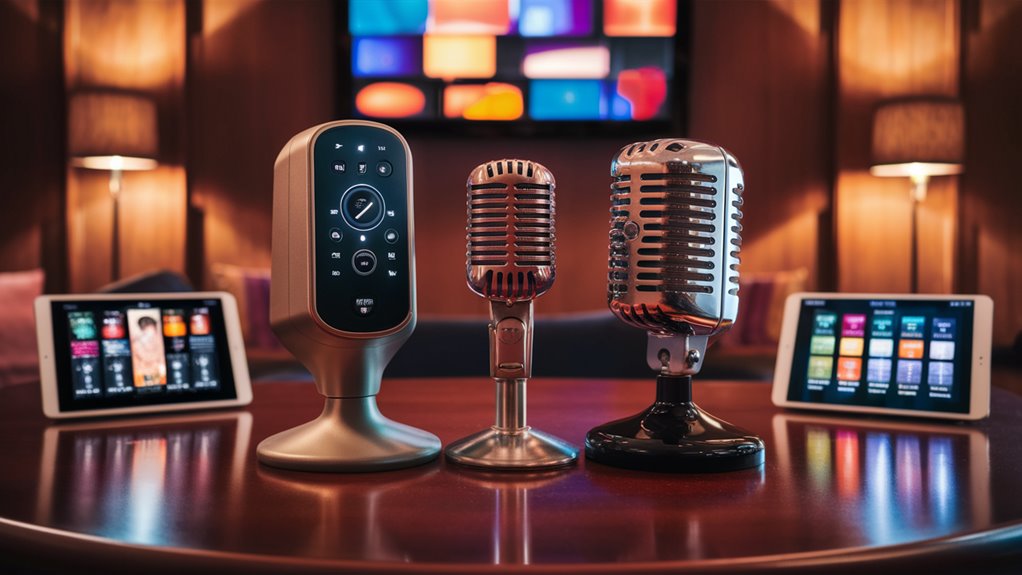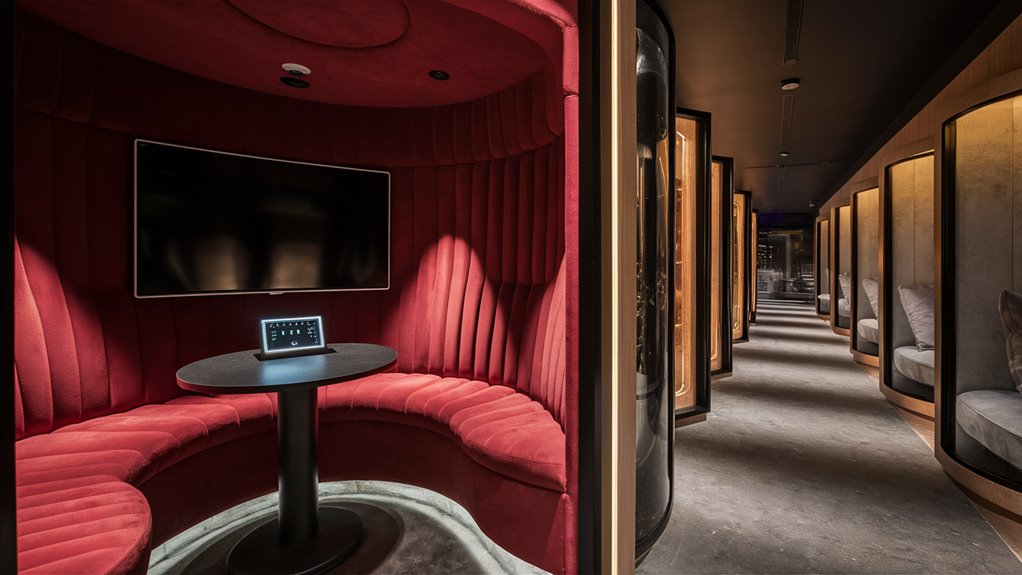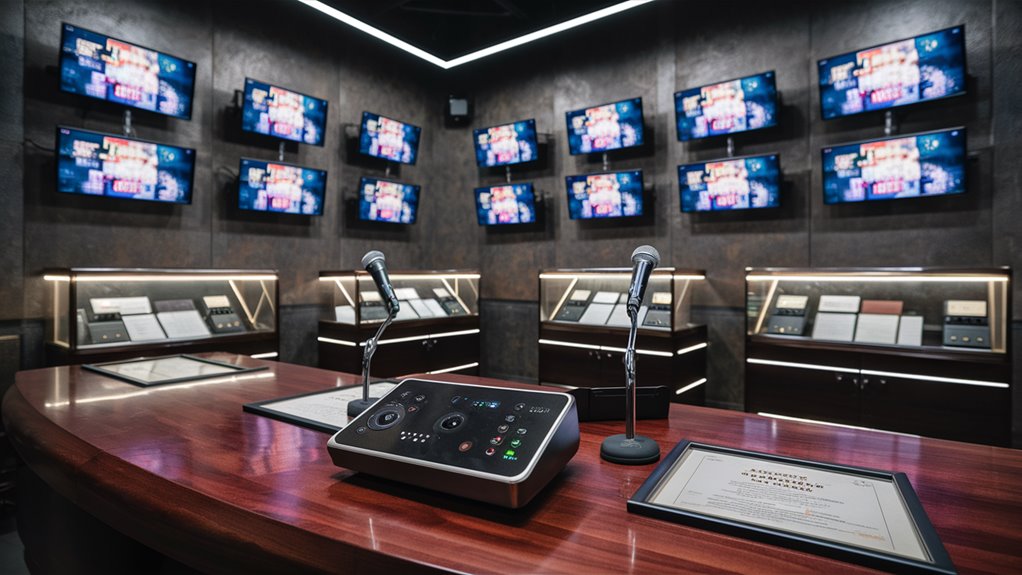
How to Pick the Best Karaoke Service for Your Needs

Choosing the right karaoke service involves considering five key factors to ensure top-notch entertainment.
Needed Gear
Consider the size of your space and budget. Basic home karaoke sets cost between $200-1000, while professional setups range from $2000-10000. Ensure your internet speed is at least 25 Mbps to avoid streaming issues. Essential components include:
- Professional mixers
- High-quality microphones more see
- Top-notch speakers
- Sound interface gear
Song List Considerations
Professional karaoke services offer extensive music libraries spanning 10,000 to 100,000 songs. Look for services with:
- Frequent updates
- Diverse music genres
- High-quality backing tracks
- User-friendly search tools
- Customizable playlists
Rules and Legal Considerations
Obtain appropriate permissions from ASCAP, BMI, and SESAC for public performances. Requirements include:
- Public performance rights
- Business establishment licenses
- Digital copy permissions
- Efficient usage tracking
- Copyright compliance documentation
Think About Your Space and Budget
Plan Space and Budget for Karaoke Events
Assess Space and Technical Needs
Evaluate your venue’s size meticulously. Consider the space available, electrical outlet locations, and acoustics for optimal sound quality.
- Small venues (under 50 people): A single speaker system suffices
- Larger venues: Multiple speakers and an enhanced sound setup required
Consider Budget and Gear Options
Rent vs. Buy Overview
- Rental costs: $150-500 per night
- Purchase options:
- Basic systems: Starting at $500
- Professional setups: Cost between $2,000-5,000
Key Financial Considerations
Licensing and Legal Requirements:
- ASCAP/BMI permissions: $200-800 annually
- Mandatory public play permits
Additional Costs:
- Equipment maintenance
- Storage space
- Insurance coverage
- Backup microphones
- Technical support
Budget Planning
Budget allocation tips:
- Main equipment: 65-70%
- Licenses and permissions: 15%
- Contingency fund: 15-20%
- Maintenance expenses: 5-10%
Consider long-term costs when deciding between renting and buying. Assess venue requirements and event frequency for effective budget planning.
Song List Selection
Choosing the Ideal Karaoke Song List
Essential Features of a Song List
List size and song quality are crucial when selecting a karaoke song list. Professionals typically offer vast libraries ranging from 10,000 to 100,000 songs, but numbers alone shouldn’t be the focus.
Variety of Music and Audience Preferences
A diverse range of music styles ensures success. Include:
- Classic rock and oldies for older audiences
- Contemporary pop and hip-hop for younger guests
- Multilingual selections for diverse groups
Song Additions and Sound Quality
Frequency of New Additions
Regular addition of new songs keeps the list dynamic and enticing.
Sound Quality
- Professionally recorded tracks
- Key differentiation for vocal variety
- Superior sound quality
Licensing and Legal Considerations
Prioritize proper usage permissions for commercial purposes. Opt for providers that offer:
- Full song usage rights
- Commercial use permissions
- Streamlined licensing processes
- Updated compliance documentation
Professional services often incorporate licensing costs into their plans, safeguarding against legal complications and ensuring uninterrupted performances.
Sound Equipment Essentials
Guide to Professional Karaoke Sound Equipment

Essential Sound Components for Professional Karaoke
Adequate karaoke sound equipment is vital, impacting audio quality and overall success.
Core Sound Equipment Requirements
Amplification and Speakers
- Professional powered speakers (minimum 300 watts per channel)
- Suitable for audiences up to 100
- Advanced sound amplification system
Microphone Systems
- Professional UHF wireless microphones
- Options for wired microphones
- A minimum of two wireless systems for optimal functionality
- Backup microphones for contingencies
Mixers and Enhancement
- 8-channel audio mixer for superior sound management
- Feedback suppression system
- Digital audio enhancements for clarity
- Professional-grade sound interfaces with balanced outputs
- Compatibility with computers
Setup Essentials for Any Venue
Necessary Accessories
- Durable speaker stands
- Professional XLR cables
- Power distribution system
- Rack systems for equipment protection
- Spare cables for replacements
Technical Specifications
- UHF frequency range for interference-free signals
- Balanced audio outputs
- Digital signal processing
- Multiple channel mixing capabilities
- Robust audio enhancements
This setup ensures professional-quality sound and system longevity.
Internet and Technical Requirements
Essential Internet and Technical Specifications for Karaoke Systems
Internet Requirements
Fast internet is critical for digital karaoke setups today. A minimum download speed of 25 Mbps and upload speed of 5 Mbps ensure seamless streaming and updates.
Commercial venues require robust connections to handle multiple streams and concurrent system demands.
Hardware Specifications
System Specifications
- Processor: Quad-core or greater
- RAM: At least 8GB for optimal performance
- Storage: Minimum 256GB for storing song libraries
- Graphics: Dedicated GPU recommended for clear video output
Network Configuration
- Stable wired internet for primary setup
- Wireless backup for flexibility
- Ample USB ports for auxiliary equipment
- HDMI outputs for display connections
Compatible Software
Compatibility with the operating system is crucial for optimal karaoke software performance.
While Windows offers extensive software support, Mac and Linux platforms now feature robust karaoke applications. Consider:
- Browser requirements
- Support for diverse audio and video formats
- Add-ons for enhanced functionality
- Update capability for continuous system operation
This meticulous approach ensures efficient setup and sustained use, whether at home or commercially.
Pro vs Home Karaoke Gear
Pro vs Home Karaoke Systems: Comprehensive Comparison Guide
Evaluating Equipment and Performance Quality
Professional karaoke systems deliver exceptional performance using top-tier components like powerful amplifiers, professional speakers, and advanced mixing consoles.
These configurations offer enhanced audio processing, superior feedback management, and extensive microphone inputs, ideal for commercial venues and professional events.
Home Equipment Specifications and Limitations
Home karaoke systems feature simplified components focused on basic necessities.
These setups typically include basic audio features like simple echo effects, basic mixing capabilities, and a limited number of microphone connections.
While suitable for casual home entertainment, they lack the durability and sophistication of professional gear.
Cost Considerations and Performance Effectiveness
Cost Comparisons
- Professional Systems: $2,000-$10,000
- Home Systems: $200-$1,000
Primary Performance Drivers
- Venue Requirements: Professional equipment is optimal for larger spaces
- Usage Frequency: Commercial gear withstands regular use
- Technical Support: Professional systems offer comprehensive support commitments
- Audio Quality: Business-grade equipment delivers superior sound
- Lifespan: Professional gear typically outlasts home setups
- Connectivity Options: Multiple input/output configurations in professional gear
Selection depends on venue size, usage frequency, and budget allocation.
Professional systems, though pricier, offer the reliability necessary for commercial use.
Home systems are budget-friendly for less frequent home use.
Licensing and Copyright Considerations
Essential Guide to Karaoke Licensing & Copyright
Understanding Basic Licensing Requirements
Commercial karaoke operations require three key licenses for legal compliance.
The primary requirement is a public performance license from leading music rights organizations like ASCAP, BMI, and SESAC. These licenses cover public exhibitions of copyrighted music.
Synchronization rights are the second necessity, allowing businesses to legally display song lyrics with music.
The third aspect, mechanical rights, allows for the production of song copies for karaoke usage.
Solutions from Professional Karaoke Providers
Established karaoke service providers streamline legal compliance with comprehensive licensing packages.
These providers maintain extensive song libraries with pre-negotiated rights, eliminating complex individual negotiations for each song.
Professional karaoke plans typically entail:
- Fully licensed song libraries
- Regular song updates
- Compliance documentation
- Technical support and updates The Pros and Cons of Different Karaoke Room Systems
- Legal coverage in case of disputes
Considerations for DIY Licensing
Business venue owners must understand that home-use licensing is not applicable in commercial settings.
Separate negotiations would be required for each song:
- Individual negotiations per track
- Multiple license types per song
- Active compliance monitoring
- Significant financial investment
- Periodic renewal of rights
The optimal and safest approach is partnering with licensed karaoke services that maintain updated licensing arrangements and frequently refresh song catalogs to adhere to evolving copyright standards.



